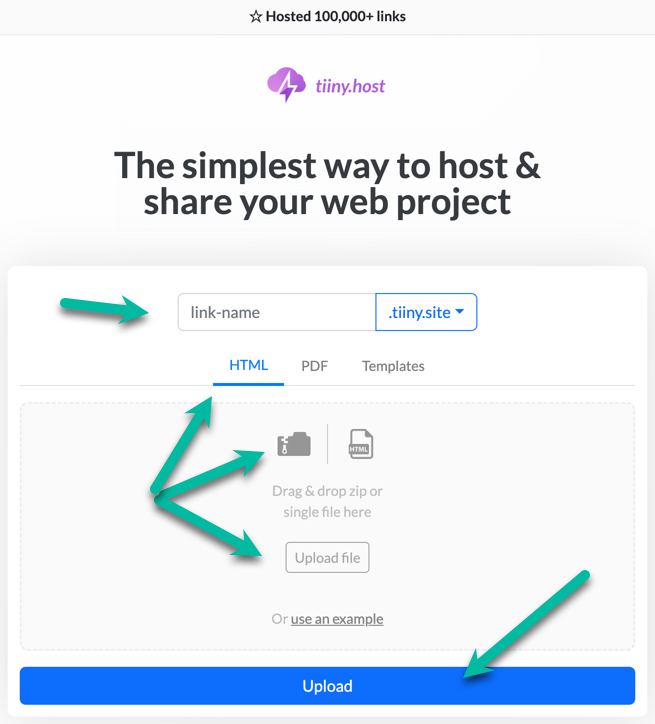- Portfolio Websites
- Landing Pages
- Microsites
- E-commerce Websites
- Documentation Websites
- Non-profit and Charity Websites
- Blog Websites
- Educational Websites
- Event Websites
- Community Websites
- Job Board Websites
- Membership Websites
- How do I host my static website?
- Next steps
There are approximately 24 million online stores on the web already. Wow!
If you think that you’re too late to the party to be successful, you’d be mistaken. The global online market was worth over 9 trillion dollars in 2019 and is expected to grow more than 14% by 2027.
That’s a lot of money.
You can get your piece of the 10-trillion-dollar pie. But how? By taking the leap and setting up your own static business website.
“But what kind of business websites are there?” you ask.
Let’s look at 12 examples of static websites for your small business. Then we’ll touch on how to host your static site.
Here we go…
RELATED ARTICLE: How to Build a Static Website
Portfolio Websites
These websites showcase an individual’s or a company’s work and expertise. They’re ideal for freelancers, creatives, and professionals who want to demonstrate their skills and attract clients or customers.
Portfolios contain work samples to show off your finest accomplishments. They highlight your skills and services. You can include testimonials in the form of quotes from satisfied customers or the logos of successful companies you are affiliated with and have served well.
Landing Pages
A landing page is a single-page website promoting a specific product, service, or offer. Its primary purpose is to encourage visitors to take action, such as signing up for a newsletter or making a purchase, making it an essential part of marketing campaigns.
Landing pages focus your visitor’s attention on the specific action you want them to take, using a clear call to action. A good landing page will have compelling visuals to generate leads and conversions.
Microsites
Microsites are small, stand-alone websites dedicated to a specific topic, product, or campaign. They enable businesses to target a niche audience or promote a single aspect of their company without overwhelming visitors with unrelated information.
They are beneficial in niche audience targeting and promoting a single product or service. The microsite is separate from the main website to clarify and highlight your message.
E-commerce Websites
E-commerce websites act as online platforms for buying and selling products or services. They are designed for businesses focusing on online sales, allowing customers to browse and purchase items directly from the site. A great sample can serve businesses selling custom things with the help of authority eCommerce platforms. Hence, it’s a common practice to see a retail company selling custom products on Etsy or Shopify boosting its sales rate.
If you have anything to sell, it will likely happen on an e-commerce site. Here you showcase your catalog and product descriptions. There is a shopping cart and checkout procedure to collect the funds from your visitors. These shopping carts enable secure payment processing.
Documentation Websites
These websites serve as a centralized resource for product or service documentation, user guides, and manuals. They are especially useful for businesses with complex products or services that require user support and guidance.
These days, well-written documentation is part of product design. After all, what use is it to offer a product nobody can understand? Great documentation helps sell your product and keeps loyal customers coming back for more of your well-supported offerings.
Non-profit and Charity Websites
Non-profit and charity websites provide platforms for organizations to share their mission, goals, and initiatives. These encourage community support and engagement through compelling storytelling, donation functionality, and event and volunteer opportunities.
Raising awareness is key. You want to engage and mobilize your supporters to action. Your website can also promote transparency and trust, which is vital to your success.
Blog Websites
Blog websites are platforms for sharing articles, news, and opinions. They are suitable for businesses looking to establish thought leadership and engage with their audience through regularly updated content.
Well-designed blogs boost engagement with customers and prospects. They also boost your SEO rankings, spreading the word about your products and services. Blogs are still relevant in today’s market. Where else will you establish such a foundation of customer and product information so accessible to your customers?
Educational Websites
Educational websites are platforms for sharing educational content, courses, and resources. They are ideal for businesses offering training, workshops, or learning materials and provide features such as course listings, learning management system integration, and multimedia content.
Online courses are a great way to expand your customer base. Courses are a product that expands your documentation and support efforts. They generate additional revenue streams while helping your customers.
Event Websites
Event websites are dedicated platforms for promoting and managing events, such as conferences, workshops, or other gatherings. They are designed to streamline event planning and promotion by featuring event details, schedules, speaker information, and registration and ticketing functionality.
Events can range from typical professional gatherings to online webinars and special events such as concerts and cruises. There are no limits to the kind of events you can highlight.
Community Websites
Community websites foster community engagement and interaction by providing discussion forums, groups, live chat support, chat rooms, member profiles, and direct messaging. They are ideal for businesses building a loyal customer base or facilitating user-generated content.
People like to talk. The web is built around social interaction. This is your chance to build your own community, gathering those around you that share your interests.
Job Board Websites
Job board websites are online platforms for posting and applying to job openings. They help small businesses attract talent and streamline hiring by providing job listings, candidate profiles, and resume submissions.
Job boards are popular in any economy. Providing access to jobs is helpful to people. Your brand will be associated with the type of jobs you offer.
Membership Websites
Membership websites are exclusive platforms that require users to subscribe or become members to access content or services. They suit small businesses looking to monetize premium content or create a loyal customer base.
This is another way to monetize your community. By having paid subscriptions, you restrict access to your members and keep control of spamming and civil conversation. People are happy to pay for access to specialized information and services that their membership affords.
How do I host my static website?
Visit Tiiny.host for fast, secure, and easy hosting of your static website.
As a user of Tiiny.host myself, I can vouch for them. They’re great!
Once you visit the homepage at Tiiny.host, you are three simple steps from your project being live on the web.

- Enter the link-name for your site.
- Choose HTML, then drag and drop or upload your zipped website file.
- Click the big blue “Upload” button.
That’s it!
Next steps
Tiiny.host offers everything you need for sharing a professional or personal website on the internet.
Tiiny.host’s customer service is awesome! Contact them directly at Tiiny.host/help and see. They’ll answer your questions about their services, help you out with any problems, and explain any issues raised by this article.



